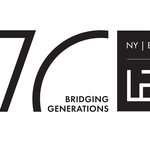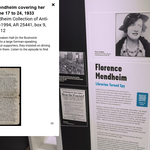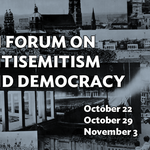Leo Baeck Medal for Robert M. Morgenthau

- Autor
- David Brown
- Datum
- Fr., 18. Nov. 2016
At the LBI’s Annual Award Dinner on November 17, 2016 at the Center for Jewish History, friends, family, and colleagues gathered to honor Robert M. Morgenthau with the Leo Baeck Medal for a lifetime of public service. Director Emeritus of the Museum of Jewish Heritage David Marwell offered an appreciation that began with the Morgenthau family’s German-Jewish roots and encompassed the family’s century-long tradition of public service, including Robert Morgenthau’s legendary career as a prosecutor who used the law to protect the vulnerable and hold power to account.
As Director of the Museum of Jewish Heritage, David G. Marwell worked closely with the museum’s Founding Chairman, Robert Morgenthau, on a major expansion in 2003. On the occasion of the award of the Leo Baeck Medal to Morgenthau, he reflected on aspects of Morgenthau’s life, work and personality:
On the Morgenthau tradition of public service:
“Bob Morgenthau’s retirement as Manhattan District Attorney on] December 31, 2009 marked the end of the nearly century-long, unbroken chain of public service of the Morgenthau family. Henry Morgenthau, Sr. served as the Ambassador to the Ottoman Empire under Wilson. He witnessed the Armenian genocide and, at considerable cost to his own career, became its most outspoken and articulate chronicler […]. His famous 1914 telegram raised the alarm about the plight of the Jewish community in Palestine and led to the founding of the American Joint Distribution Committee. Bob’s father, Henry Morgenthau, Jr. […] did more than most people will ever know to combat Hitler in the early days of WWII, before American involvement. By helping to arm Great Britain early on, he had a critical impact in stopping Hitler in North Africa, preventing him from invading the Middle East. Late in the war, Henry Morgenthau, Jr., responding to his own frustration and at the urging of his young staff, convinced the president to establish the War Refugee Board, which is credited with having saved as many as 200,000 lives.”
On his record as Manhattan District Attorney:
“Bob Morgenthau took advantage of the centrality of Manhattan as a business and banking center to extend his jurisdiction deep into uncharted territory. He combated organized crime, developed new and innovative law enforcement techniques, brought women in large numbers into the office and in leadership positions, and focused not only on crime in the streets but also on crime in the suites. He did more, arguably, than anyone else to make New York City a safer and fairer place to live.”
On his modesty and humor:
“Steve Kaufman, the chief of the criminal division and a particularly close associate of Morgenthau’s, informed him that it was time that he improved his wardrobe. Bob was not then—and he is not now—a candidate for a cover shot on GQ. In an attempt to remedy the situation, Steve took Bob to a trendy Madison Avenue Mens’ Boutique, and the salesman showed him a beautiful, well-tailored suit of the most exquisite fabric. Bob asked the price, and the salesman responded $900 (which at the time was real money). Bob tried it on, and it looked great. When the salesman asked, “So would you like one?” Bob responded “No, but I would like a list of every one of your customers who purchased one.” Modesty and humor—a wicked combination, that for a leader can concatenate loyalty and devotion, fidelity and fervor.”
On his reflective and resolute leadership:
“I remember—and will for the rest of my life—the lunch I had with Robert Morgenthau in September 2001—it was our first meeting after 9/11. The subject was the immediate future of our museum and our ambitious plans to construct a major expansion. He gave me my instructions: “get it clean, get it safe, get it open.” He knew we needed to make a statement—not only for ourselves, but for our wounded neighborhood and our suffering city. […] “If we don’t move forward,” he said, “we will all be left behind.” From that moment on—in my mind—the new wing became the Robert M. Morgenthau Wing, and my board agreed and voted to place Bob’s name above our door. On that day Bob Morgenthau was reflective and resolute—two qualities that can clearly be meaningful by themselves, but can form, together, a potent compound that combines a respect for the past and a promise for the future.”
Aktuelles





